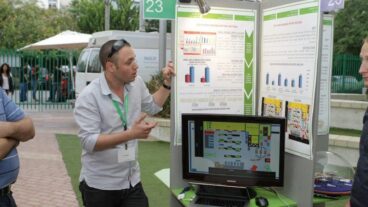Girls as young as 14 who are exposed to chemotherapy for treating breast cancer, Hodgkin’s disease, and other non-malignant diseases such as lupus, put their reproductive system at risk. The chemotherapy can trigger premature menopause and leave women infertile.
New research by an Israeli team of doctors, led by Prof. Zeev Blumenfeld from the Rambam Medical Center and the Technion Faculty of Medicine in Haifa, has found an effective new treatment that helps keep a woman’s reproductive health intact while undergoing aggressive chemotherapy treatment.
Blumenfeld and his colleagues have found that a monthly injection of a gonadotropin-releasing hormone (GnRH) agonist before and throughout chemotherapy treatment can reduce the risk of premature menopause from 50 percent to less than eight percent.
Blumenfeld and his colleagues compared ovarian function in a group of women with Hodgkin’s lymphoma receiving a monthly injection of a GnRH agonist. The women were given the injection before the start of chemotherapy until its end. Researchers compared these women who were treated with a similar dose of chemotherapy against Hodgkin’s, but without the GnRH agonist.
As reported in the journal Fertility and Sterility in January 2008, only 3.1 percent of women in the GnRH agonist group developed premature ovarian failure. In contrast, 37 percent of the patients who did not take the GnRH agonist developed premature ovarian failure.
The researchers also found the treatment works in women with breast cancer and leukemia. Blumenfeld tells ISRAEL21c: “We’ve just published a unique report of a young Israeli woman who had two bone marrow transplantations. She underwent a very aggressive chemotherapy treatment.
“With only one bone marrow transplantation, there is more than a 96 percent chance she would become menopausal and unable to have children. We put her on a GnRH agonist and now we were lucky to find that she is pregnant again with her second child. This is an exceptional case and probably the first worldwide of spontaneous conceptions after two bone marrow transplantations in the same patient.”
A GnRH agonist is a synthetic peptide modeled after a brain neurohormone that stimulates the pituitary gland to release hormones. The peptide has been used in a number of ways from delaying puberty in very young children to managing female disorders such as menorrhagia and uterine fibroids. It is also used in IVF treatment.
Doctors have long speculated that women who have been pretreated with GnRH agonists could be spared from suffering the lasting effects of premature menopause. The recent Israeli study strengthens the scientific argument.
Given to women from the reproductive age of 14 to 40 years, the GnRH agonist was able to suppress the menstrual cycle and temporarily create “a pre-pubertal hormonal milieu,” says Blumenfeld.
Due to a decreased count of platelets, a side effect of chemotherapy, the GnRH agonist injection also prevented the severe menstrual bleeding associated with chemotherapy, Blumenfeld found.
Currently, there are three other methods for preserving fertility in women exposed to chemotherapy and include preserving both unfertilized and fertilized ova. None are extremely successful. This new treatment developed by Israeli scientists could increase the likelihood that a sick woman will one day be able to conceive when she recovers.
Fertility and health is an important focus for Israeli scientists. Last year an Israeli team from Hadassah University Hospital in Jerusalem were the first who succeeded in removing eggs from pre-pubescent cancer patients – some as young as five – and bring them to maturity before freezing them, giving the girls a better chance to one day have children.
According to Dr. Ariel Revel, from the in vitro department at Hadassah, until now scientists had thought viable eggs could only be obtained from girls who had undergone puberty.
Blumenfeld is a friend of Revel’s, and acknowledges that Israel is a worldwide leader in the field of fertility. He says that Israeli fertility clinics see in comparison to the population size more IVF cycles than any other country in the world – about 1,500 cycles per one million people.
“We think we are the leader,” says Blumenfeld. “Both the Israeli Jewish and Arab Israeli population are faced with social pressures to have more children. Maybe for this reason our reproductive technology and research is very developed.”












